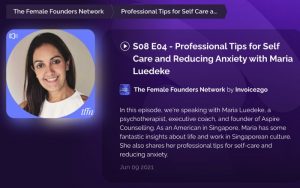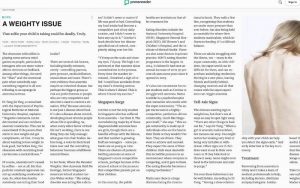Get rid of ‘guilty eating’ feelings. Here’s how to tuck in and enjoy eating food on your terms
Text: Maria Luedeke & Amanda Lim
With the holiday season upon us it’s the time of year to indulge in all of our decadent food with all of our favourite people (albeit via the power of technology for many of us). However, for some the festivities can be problematic due to the stress and anxiety that comes with “guilty eating” thanks to all the celebratory treats on offer.
After the year we’ve had, the calories in our food and drink should be the least of our worries. But that doesn’t stop people telling us how much exercise we need to do to burn off a mince pie, or a relative making a comment about our appearance. While we know that our body and the relationship we have with our diet is no-one else’s business, it doesn’t prevent some of us from grappling with a degree of “food shame.”
As the Christmas celebrations continue, we speak to health and wellness experts psychologist Maria Luedeke and nutritionist Amanda Lim of the Butterfly Project Singapore. Here, they talk about how to enjoy food without overeating and beating ourselves up throughout the holiday season and beyond.
1. What is guilty eating?
“Guilt eating” is at its heart emotional eating — eating in response to a “feeling” stimulus that is not physical hunger. Guilt eating often occurs when we are unable to manage or react to situations using our normal coping strategies, and we turn to food as a comfort, pain reliever or distraction. Guilt as an emotion occurs when we believe that we’ve acted in such a way that violates our personal standards of what is normal, healthy or good. When we connect food to that emotion, it often results in regretful or shameful thought patterns long after the food is gone. Labelling foods as “good” or “bad” creates a similarly evocative emotional response when we then eat those foods.
2. Is the standard perception of guilty eating considered to be unhealthy?
Eating out of guilt is often connected to eating large amounts of food, feeling embarrassed about the type of food being eaten, or eating well past the point of fullness or discomfort is usually unhealthy. Guilt eating doesn’t look one particular way — for some it can be a total binge, for others just a single bite of a food they’ve deemed “off limits.” Social norms heavily influence people’s perception of healthy versus unhealthy foods although they often think it is simply their own hunger drives or desires.
3. Did you see changes in the eating habits of your clients around the circuit breaker?
After the circuit breaker, we definitely saw two responses to the stay-at-home phase: clients developed noticeably better nutrition and wellness habits, or noticeably worse ones. Whereas some clients found time to cook at home more, discover healthier food choices and engage in self-care, others used food delivery services and relied on calorie-dense treat foods to help themselves feel better emotionally (the latter of which often leads to guilt eating).
Interestingly, now that the holiday season is upon us, we are finding that some clients are struggling more with guilty eating as an emotional stress response to not being able to visit home, be with family or celebrate the way they traditionally do.
4. How can we permanently do away with feelings of guilty eating?
The most powerful way to overcome guilt eating is to give yourself permission to eat. There are no “off limit” foods! When you remove the personal judgment that a certain food is “bad,” you also remove the possibility that you are “bad” for eating it.
We encourage clients to use mantras to remind themselves that eating is not a moral decision — something like “I deserve to nourish myself” or “Eating a balanced diet helps me thrive.” This can be harder for some than others which is why working with a nutrition coach, therapist or counsellor is a great step in rediscovering a positive relationship with food. Emotions can be powerful drivers in eating, so learning how to manage and process them effectively allows you to make responsive decisions with food versus reactive decisions.
5. How can you enjoy food, anywhere and anytime, without guilt?
With mindful and intuitive eating, anything is possible. People always assume that nutritionists never indulge or eat unhealthy foods, but in fact Amanda (who is a nutritionist and personal trainer) follows an 80-20 style of eating where 80% of food is nutrient-dense, high-protein and rich in fibre, and 20% of food is whatever she feels like eating — including cakes and treats.
That said, there is a difference between truly “enjoying” an indulgence — say, splitting a freshly baked cinnamon roll with a friend — versus just eating junk, like diving face-first into a bowl of Ice Kacang. Challenge yourself to stay present when eating and making choices around food. When you choose to eat something that isn’t the healthiest, savour that treat and move on. Freedom from food guilt takes work and focus, but you can do it.
6. What are your top tips around indulgence?
Give yourself permission to celebrate but “pre-decide” your limits before you go for a festive event. For example, if you’re going for drinks with friends, decide on how many drinks you’re going to have beforehand, and switch to water after you’ve hit that number.
If you’re going to a potluck, commit to bringing a nutritious sharing dish and enjoy smaller portions of other, more calorie-dense foods. Remember that when you overindulge, simply make healthier choices moving forward. Using positive peer pressure can also be a useful tool. Research has shown that people are less likely to overeat and binge drink when surrounded by others who are also avoiding those behaviours. When you allow a positive, intentional mind to guide your eating decisions, a healthy, functional body will follow.
The information here is intended as a resource only and should not be used for diagnoses or treatment. If you suspect you, or anyone you know, may need help with issues around food and eating, please consult your health care provider.





